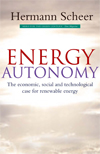 Member of the German Parliament, since 1980;
Member of the German Parliament, since 1980;President of EUROSOLAR - The European Association for Renewable Energy;
Author, policy innovator and global leader in the field of renewable energy
- Born 29th April 1944
- University studies in Heidelberg and Berlin (Economy, Social Science, Public Law)PhD at Free University Berlin (1972)
- Dr. h.c. at Technical University Varna, Bulgaria (1997)
- Recipient of the Alternative Nobel Prize in Stockholm, 1999, granted for his worldwide commitment to Renewable Energy
- Recipient of the World Solar Prize by the 2nd World Conference on Photovoltaic Solar Energy Conversion in Vienna, 1998
- Recipient of the World Prize on Bio-Energy by the 1st World Conference on Biomass in Seville, 2000
- Recipient of the Global Leadership Award by the American Council on Renewable Energy (ACORE) in New York, 2004
- Recipient of the World Wind Energy Award by the World Wind Energy Conference in Bejing, 2004
- Named Hero for the Green Century by TIME Magazine, 2002
- Dr. h.c. at University Lüneburg, Germany (2007)
- Prof. h.c. at Tongji University Shanghai, China (2008)
- Since 1988 President of the European Association for Renewable Energies EUROSOLAR
- Since 2001 General Chairman of the World Council for Renewable Energy (WCRE)
- Seminal books on the renewable energy transition: Sonnenstrategie (1993), 8th edition 1999, published also in English under the title “A Solar Manifesto”, Spanish, Italian, Portuguese, Czech, and Hungarian Solare Weltwirtschaft, 1999, 5th edition 2002, published also in English under the title “The Solar Economy”, French, Spanish, Portuguese, Chinese, Japanese, Russian, Italian, Danish, Arabian, Czech, Energy Autonomy (2005)
Biographical statement - narrative
Born in 1944, Hermann Scheer graduated from highschool in 1964. He attended the Officers School of the German Federal Army from 1964 to 1966, serving as lieutenant during 1966-67. Hermann studied economics, sociology, political science and public law between 1967 and 1972 at the University of Heidelberg and the Free University of Berlin. He received his PhD in Economic and Social Science in 1972. Dr Scheer was appointed Assistant Professor at the Technical University of Stuttgart in the Faculty of Economics, 1972-76. He worked as system analysts at the German Nuclear Research Center from 1976-1980.
Dr Scheer was first elected member of the German Parliament in 1980, re-elected in 1983, 1987, 1990, 1994, 1998, 2002 and 2005. He served as Chairman of the Arms Control and Disarmament Committee 1990-93. Since 1983 Hermann Scheer has been delegated by the German Parliament to the Parliamentary Assembly of the Council of Europe, and served as Chairman of the Committee on Agriculture between 1994 and 1997. He holds a Doctor honoris causa, bestowed by the Technical University of Varna (Bulgaria). Dr Scheer has chaired as well as initiated numerous international research and development conferences. Examples include the
• European Photovoltaic Solar Energy Conversion Conference in Glasgow (2000),
• World Wind Energy Conference in Berlin (2002) and Capetown (2003),
• Earth Conference on Biomass for Agriculture and Industry (1995),
• European Conference Solar Energy in Architecture and Urban Planning (1993, 1996, 1998, 2000);
• First International Conference on Financing Renewable Energies (1997),
• 1st and the 2nd World Renewable Energy Forum (2002 and 2004), and the
• International Parliamentary Forum on Renewable Energy (2004).
His work has been honoured with the
• inaugural SolarWorld Prize (1998),
• inaugural World Prize on Bioenergy (2000),
• Alternative Nobel Prize (Right Livelihood Award, 1999), and the
• Gold Medal of the Union for Small Hydropower.
• TIME Magazine recognised him in 2002 as one of five “Heroes for the Green Century.”
• World Wind Energy Award 2004
Dr Scheer’s work is dedicated to a broad shift in the energy basis of modern civilization: from fossil and nuclear resources to renewable energies. He has demonstrated both necessity and feasibility of this transition in his five books: The Stored Sun (1987), The Solar Age (1989), Solar Strategy (1993), The Solar Economy (1999) and Climate Change. From the Fossil to the Solar Culture (2002). In addition, Dr Scheer has also authored more than one thousand articles.
The Solar Strategy (1993) has been published in eight languages; the English version is entitled "A Solar Manifesto". The Solar Economy (1999) is distributed in eleven languages; the English publication is “Solar Economy”. These two volumes are acknowledged as the most widely read books on renewable energy worldwide, combining new technological, economical and cultural issued with policy recommendations, from the local to the global scale. They suggest that the transition to renewable forms of energy with the aid of modern technologies will lead to a “solar information society.” This shift creates the most important and promising structural change of civilisation since the beginning of the industrial age and leads to manifold benefits for societies: mitigating climate change, and overcoming national security issues, addressing the mounting water crisis, cleaning the cities, improving the health of the people, revitalizing the agricultural economy, creating new industrial jobs and fighting underdevelopment and deprivation in the developing world.
In 1988 Dr Scheer founded the non-profit European Renewable Energy Association EUROSOLAR, and in 2001 the non-profit World Council for Renewable Energy (WCRE), serving as President and. General Chairman, respectively, of the two non-governmental organizations on a honorary basis. Through these institutions Dr Scheer elaborated his original policy concepts for renewable energy disseminations, and initiated legal frameworks in Germany and the European Union. He has done so both in his capacity as a Member of Parliament, and by advising governments and parliamentarians in Europe, Africa, Asia and Latin America.
In these roles Hermann Scheer’s most successful policy innovations have been accomplished:
- the fully implemented 100.000 photovoltaic solar energy roof programme, the world’s first mass implementation program;
- the German Renewable Energy Act with 16.000 MW installed decentralized renewable energy capacity below 5 MW per installation (including 14.000 MW wind energy capacity, 40% of total world wind power installations); and
- full tax exemption for all biofuels, affording a lower price level for renewable fuels when compared to fossil fuels.




 Hermann Scheer CV (pdf)
Hermann Scheer CV (pdf)